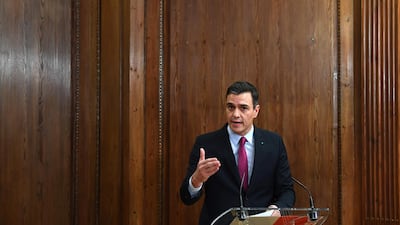Spain’s Socialist party is poised to take office next week following last-minute deals Friday, heading a centre-left coalition government and ending almost a year of uncertainty in the eurozone's fourth-largest economy.
The party, headed by interim Prime Minister Pedro Sánchez, reached the agreements with a handful of small regional parties which promised they would abstain and enable Sánchez to win a confidence vote scheduled for next Tuesday.
The Socialists got the most votes in two consecutive general elections last year. But both times they failed to capture a parliamentary majority, meaning they couldn’t win the confidence vote that is required before taking office.
The country has been run by Mr Sánchez’s caretaker government for close to a year.
Following the last election in November, Mr Sánchez secured a coalition deal with the anti-austerity United We Can party that gave him an accumulated 155 seats in the 350-seat parliament. Since then his party has battled to win the backing of — or a promise of abstention from — regional parties. The latter appeared guaranteed after Friday's deals.
Mr Sánchez is not expected to clinch an absolute majority of 176 votes in the first round of voting due Sunday but is now set to get the required simple majority — more votes for than against — in a second vote Tuesday that will place him back in the Moncloa Palace, Spain's seat of government.
It would be Spain's first coalition government since the country returned to democracy in 1978, three years after the death of long-time dictator Gen. Francisco Franco.
The Socialists insist the deals they have reached will allow their coalition government to last its four-year term. But they will continually have to rely on the goodwill of some 20 deputies who agreed to abstain, and it could be a rocky road ahead for Mr Sánchez.
The deepest doubts about the government's staying power stem from the abstention deal clinched with the 13-deputy regional Catalan ERC party, one of several groups that want Catalonia’s independence from Spain. Most of his political opponents accuse Sánchez of allying himself with parties that want to break up Spain.
The Catalan independence push has caused Spain’s most serious political crisis in decades.
The Socialists defend the deal, saying the Catalan crisis must be resolved through talks, something they have agreed to do with the ERC.

